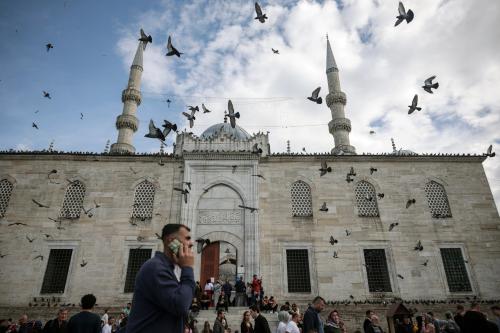Last Monday, only a few people knew about an obscure anti-Islam video produced in the U.S. Today, people around the world are aware of it. The video sparked protests worldwide, starting in Egypt and Libya, and then spreading to other countries. Tragically, some of the protests turned violent and took the lives of Americans, Libyans, Tunisians and Yemenis.
The protests have subsided for now, it seems. In assessing what happened, we have to be cautious and ensure that we do not point fingers in the wrong direction.
As things become clearer, it seems that the video was created and promoted by members of the American Coptic Christian community — a community with its roots in Egypt. It is understandable that Muslims worldwide were deeply offended by the video. The United Nations called the video “hateful” and the Obama administration called it “disgusting.”
But, there were other elements at work in the some of the protests; there are those who used anger at the video to promote their own agendas. For example, the attack on the U.S. Consulate in Libya was likely a terrorist operation that took advantage of the protests.
In the midst of all this, it is not surprising that some people looked to assign blame and demand apologies. These people within the Arab world began blaming the Coptic community — a community whose very name means “Egyptian.” In response, the Coptic Church, both in Egypt as well as in the United States, insisted that it has nothing to do with the video. It also said that the video does not in any way represent the view of the Coptic community.
I do know a Copt who was involved with the promotion of the video. I met Morris Sadek earlier this year. Sadek’s personal actions have nothing to do with the Coptic Church or the Coptic-American community. Virtually no Coptic Christian I encountered had heard of him before. They know about him now. And in response, he received a volley of shoes from outraged members of the Coptic community for his promotion of bigotry.
It is a mark of Christian value for the Coptic Church to condemn the video and its filmmakers. But the Coptic Church should never be placed in the position of having to apologize for the actions of a few of its members.
The same applies to Muslims. From the local representatives of Muslim communities in America, to the religious establishments of Egypt and Libya, to the leadership of the Organization of the Islamic Conference, which represents all Muslim countries, we have heard apologies and condemnations for the violence.
The Muslim community at large is not responsible for the violence, and it should not be expected to apologize for the actions of some of its members. The violent actions of a comparatively small number of individuals do not represent all Muslims, just as the video does not represent the views of all Coptic Christians. Neither group needs to apologize, but both should be recognized for their solidarity in condemning the violence.
At some point, there do need to be levelheaded discussions about hate speech (which is legal in America, unlike most other countries), the roots of widespread anti-Americanism in the Middle East and elsewhere, and what different cultures consider as sacred.
Before that can take place, we should be careful about whom we hold accountable. It should be those who have been directly fanning the flames of intolerance not just over the last few months, but over the years.
The video did not appear in a vacuum. There is a well-organized network that thrives on promoting anti-Muslim bigotry within the U.S. It provided an ideological base for Anders Breivik, recently convicted of mass murder in Norway. Similarly, there are those within the Muslim Arab world who also push for a hateful agenda, to devastating effect.
The last few days are just a reminder of how important it is to confront such promoters of hate. Whether it’s through legal channels or social pressures, they must be dealt with. Their aim, simply, is to engineer cultural wars between non-Muslims and Muslims. That must not be allowed to happen.
The least we can do now is to make sure not to blame the wrong people for the vile actions of a few individuals. That is, after all, precisely what they want — for us to do their dirty work for them.
The Brookings Institution is committed to quality, independence, and impact.
We are supported by a diverse array of funders. In line with our values and policies, each Brookings publication represents the sole views of its author(s).



Commentary
Op-edAnti-Islam Video Does Not Represent Coptic Community
September 16, 2012